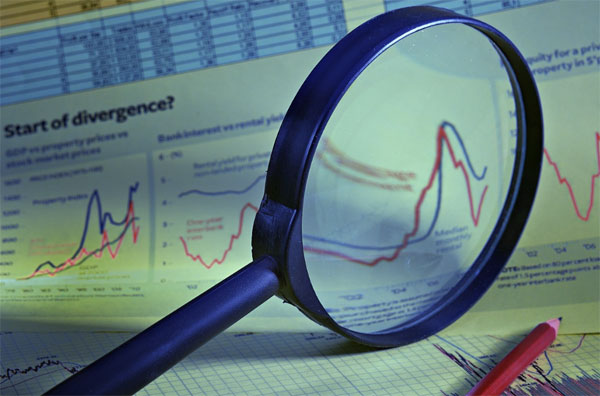The U.S. economy plummets from record highs to recession fears in just 20 days

[A photo shows a magnifying glass placed over the stock market trends and economic analysis, Photo Credit to Pixabay]
The U.S. stock market has undergone a significant shift, transitioning from a period of elevated valuations and robust GDP growth to a sudden downturn, ultimately culminating in a recession.
Just three weeks prior, the American economy appeared to be thriving, with the share markets at record-high levels and GDP growth rate maintaining at the same steady pace.
However, in a dramatic about-turn, recession concerns have begun dominating headlines, unsettling investors and raising doubts about the economy’s stability in the future.
On March 10th, the Dow Jones Industrial average dropped by around 400 points, while the Nasdaq experienced its worst performance in two and a half years.
This decline was triggered by President Trump’s revelation that the US will impose its 50% tariff on steel and aluminium imports from Canada with possibly further measures to follow, increasing fears of high inflation and an economic slowdown.
Analysts suggest that the primary catalyst for the recession is due to Donald Trump’s trade policies as it leads the world market to be uncertain, leading to more market volatility.
David Kelly, the chief global strategist at JPMorgan Asset Management, noted that companies are waiting for the right time to invest since there are myriads of uncertainties at the moment, likening them to being “deer in the headlights.”
Former Secretary of the Treasury Larry Summers also offered his cautionary words that the economy can fall into a “vicious circle” as the economic performance fuels volatility.
Furthermore, former New York Federal Reserve President Bill Dudley blamed Donald Trump for increasing tariffs because this will raise prices and US consumers will be forced to bear the high price.
The Nasdaq declined 4% on Monday– its largest percentage drop since September 2022.
Amid the broader market downturn, the technology sector was particularly hit hard; Tesla plummeted by an incredible 13%, with other big technology stocks, such as Nvidia, Apple, and Alphabet, falling more than 5%.
As a result, investors have begun shifting the composition of their portfolios from risky assets to safe havens such as utilities and consumer staples.
Though the stock market is not a definitive indicator for the overall economy, sustained volatility will negatively affect the consumer confidence level: a decline in the level of confidence among consumers normally equates to less spending, which can also decelerate economic growth.
Delta Air Lines trimmed its earnings forecast earlier, attributing weakening demand for air travel by corporate and customers to uncertainties people have at this time, leading them to save rather than spend.
Goldman Sachs last raised its recession risk at 12 months from 15% to 20%, including trade policies on its central risk factors.
At present, the Fed also fails to direct the economy at this stage: the central bank would usually respond with lowering interest rates to accelerate the economy; however, the Fed remains still as it does not know the optimal solution for the economy at the moment.
Although the American economy proved to be resilient against economic downturns such as the COVID-19 pandemic, global supply chain disruptions, and inflation, its economic activity remains low.
However, the recent economic instability-driven in great part by the unpredictable policy fluctuations-is a new and perilous challenge.
Businesses and investors will be watching the White House and the Federal Reserve’s next moves with interest as they look to anticipate potential economic hurdles.

- Choi Sunwoo / Grade 10
- KIS Jeju

![THE HERALD STUDENT REPORTERS [US]](/assets/images/logo_student_us.png)
![THE HERALD STUDENT REPORTERS [Canada]](/assets/images/logo_student_ca.png)
